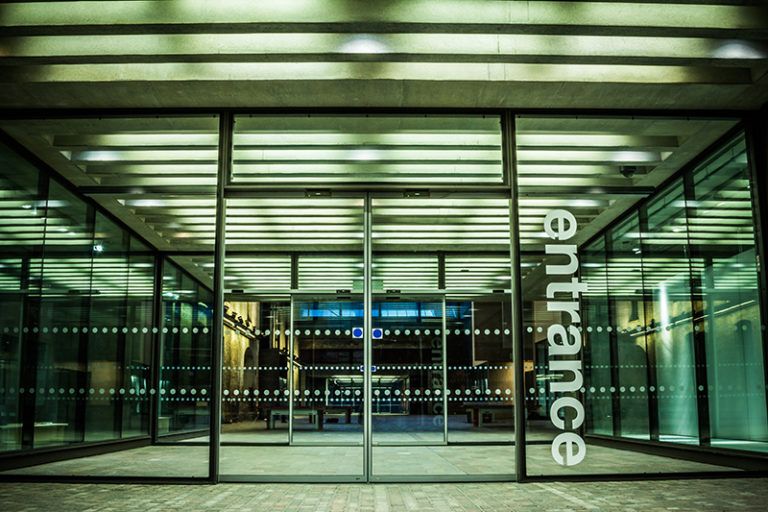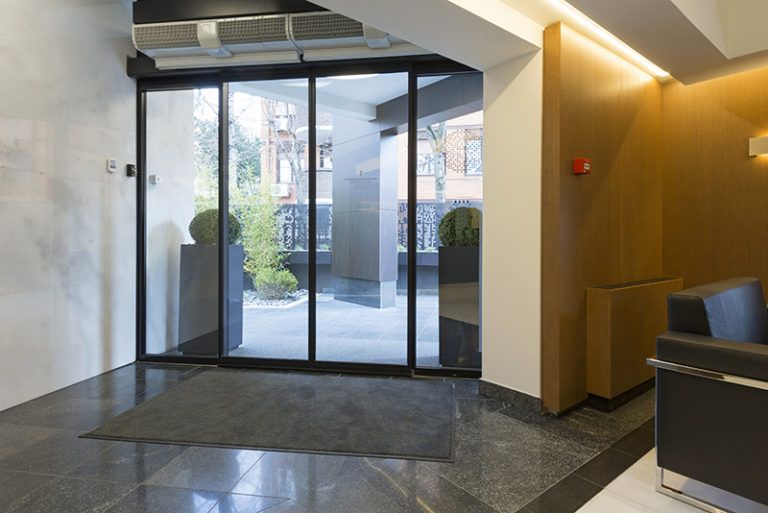
We often don’t think about things like lobby doors until there’s a problem. Malfunctions happen and can cause injuries. You can easily avoid this liability, as well as prevent possible injuries, with repairs and preventative maintenance. If you’re hazy on all of the critical touch points for the ongoing care and maintenance of glass door entrances, this post will clear up those issues.
Your entryway is the first thing people see when they come to your business. To make a good impression, typically business owners consider such aesthetics as the right paint color for walls, lighting, and beautiful wall decorations. What shouldn’t be overlooked, however, is what is required to keep your customers safe. The care and proper maintenance of all things glass — from the door to the windows — must also be considered, from the moment a new business is launched. They should be constantly monitored forever afterward, as well, and here are some reasons its part of a smart maintenance strategy.
The top five benefits of lobby door (and window) maintenance
1. Security
Damaged and unsafe doors can pose a danger to property and human life. There are fail-safes in place to keep everyone safe, but without proper door maintenance, security might fail. Make sure that frames, sensors, and springs are properly cared for and maintained.
2. Liability
ADA compliance is a complex and ever-changing concern for any business that serves the public. This is an ongoing obligation under ADA mandates and doors must be maintained in order to continue to be accessible. According to accessible expert architect Janis Kent, FAIA, CASp, public accommodations need to be maintained in operable working condition and are required to be readily accessible to and usable by persons with disabilities by the American Disabilities Act (Specifically under Sec.36.211 Maintenance of accessible features.) Additional concerns are closing speeds and operating force. There are special instruments that are needed to test to ensure compliance with the regulations for access.
“… this aspect of doors and gates is required to be maintained under the ADA Standards. Whether this is an annual ‘tune-up’ or more or less often may depend upon the age and conditions of the building and even upon the closer mechanisms installed. Having the doors compliant provides for more access, and, perhaps less legal challenges.”
–Janis Kent, FAIA, CASp, Architect, Stepping Thru Accessibility
3. Less overall operating cost and downtime
If a door is properly maintained, you can expect a lower overall operating cost for repairing problems that arise. Instead of waiting for a panel to break or fail, it is best to have routine inspections that will detect the early signs of failure. With early detection, problems can be quickly adjusted or avoided before they turn into a bigger issue that could require replacement parts and repair. It is frequently more cost-effective, when discovered early, to tweak and adjust a component not operating to spec than to have to replace it. In some cases, there’s also lost time to consider, if the necessary part has to be ordered and there is a long lead time involved.
4. Appearance
If your door is made of glass, it is important to maintain the door in perfect working condition to project the correct professional appearance for your business. If a little scratch is not taken care of, it can lead to chipping, cracking, or a bigger liability. If a less-than-smooth opening or closure is visibly evident, it does not bode well for the attention to detail that your business will pay to your customers or clients either. It is generally believed that what people see, they get; From the moment tenants or customers enter your building or business, all signs should indicate that attention to detail is important to the owners.
5. Value
A well-cared-for entrance will benefit overall the value of the building. If you have a door that is not working properly or has cosmetic flaws, this poses a risk to the owner’s investment.
Bonus – 6. Peace of mind
When you practice proper door maintenance, there’s no need to worry about potential liability issues. You have followed proper procedures to keep your business, customers, family, and property safe.

Commercial entrances and doors get substantial abuse, day in and day out, intended or not. Unlike a typical residential door, commercial doors’ high usage takes a toll on the door itself, along with all of its hardware. Preventative maintenance ensures that your doors stay in optimal working condition for a long time. This should be done regularly, depending on foot traffic, at least once or twice a year to increase the lifespan of your commercial door. Giroux Glass experts suggest having your commercial doors checked during the early spring and late fall.
Building entry and lobby doors are subject to considerable wear and tear. If you hope for your doors to last their expected lifespan, be aware of the use of excessive force sometimes exerted merely to open them. For example, kicking a door open, or keeping it propped open for a long time will likely decrease your door’s lifespan by several years. Hardware is also impacted by constant use and sometimes, abuse. By forcefully turning the key when unlocking doors, broken locks and keys can result – an event wished by no business, ever. If excess force is required to open or unlock a lobby door, that alone may be evidence of deeper issues that should be addressed.
The bottom line is, whether you address these maintenance issues before they become a liability or after they become an accident is a difference in knowing where to start.
